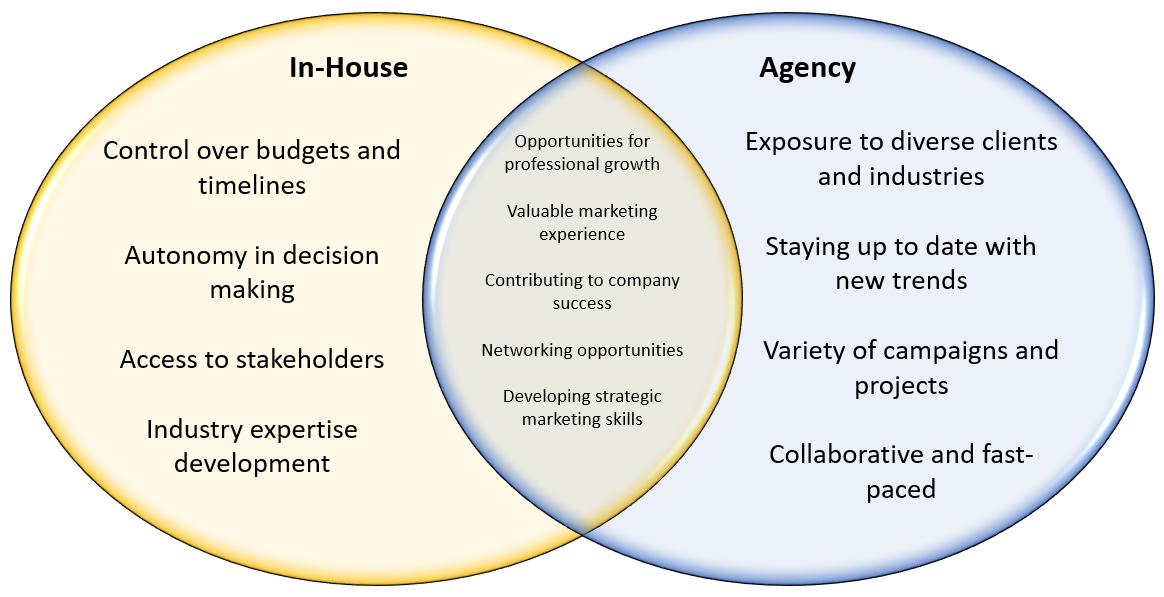In the marketing industry, professionals have been increasingly drawn to in-house positions over agency roles. Recent studies show that a significant majority of junior and mid-level marketers are now seeking in-house jobs. The perceived advantages include better salaries, larger bonuses, and improved benefits. However, is switching to in-house always the best decision? In this article, we will explore the differences between in-house and agency positions, outlining their respective pros and cons to help you make an informed career choice.
Marketing Agency vs. In-House: Differentiating Factors
While both in-house and agency positions involve marketing, there are some significant distinctions to consider. In-house roles require working exclusively for a single company, focusing on marketing their business and products. On the other hand, agencies are usually smaller organizations that manage marketing efforts for a portfolio of different clients. Let’s delve into them.

In-House
Advantages of In-House Marketing Positions:
- Control over Timescales and Budgets: In-house teams have a greater say in structuring marketing budgets and can actively contribute to planning and coordinating the company’s marketing strategy. They have more control over creating cohesive messaging.
- Autonomy in Decision Making: In-house marketers have more influence on the direction of marketing campaigns. Their early involvement in the process allows for greater input, resulting in more meaningful contributions, questions, and suggestions.
- Access to Stakeholders: In-house professionals enjoy better access to key stakeholders within the company. This access provides valuable information that can influence campaign direction and allows for quicker and more effective communication when challenges arise.
- Industry Expertise Development: Working in-house offers the opportunity to specialize in a specific industry. This deep level of expertise positions professionals as leaders in marketing for that sector.
- Skillset Expansion: Larger organizations provide opportunities to work closely with non-marketing functions, enabling professionals to broaden their skillset beyond marketing. This exposure may encompass project management, programming, operations, and more.
Disadvantages of In-House Positions:
- Lack of Understanding or Interest: Stakeholders and colleagues within the company may not fully understand or appreciate the value of marketing efforts, potentially hindering collaboration and support.
- Corporate Shuffle: In larger organizations, it is possible to feel lost or overlooked within the corporate structure.
- Repetitive Campaigns: Working exclusively for one company can lead to repetitive campaign work, limiting exposure to variety and new challenges.
Who’s best suited for in-house roles?
In-house positions in marketing are well-suited for individuals who thrive in a focused, specialized environment and prefer working closely with a single company.
The following characteristics would make someone a good fit for an in-house role:
- Detail-oriented and organized: In-house marketers often have control over budgets and timelines, requiring strong organizational skills to effectively manage resources and meet deadlines.
- Proactive and autonomous: The autonomy in decision making and early involvement in campaigns require individuals who are confident in making independent judgments and taking ownership of their work.
- Strong communication and relationship-building skills: Access to key stakeholders within the company is a valuable advantage of in-house roles. Individuals who can establish effective working relationships, communicate well, and influence decision-making processes will thrive in this environment.
- Industry-focused mindset: In-house positions offer the opportunity to develop deep expertise within a specific industry. Individuals who have a passion for a particular sector and a desire to become leaders in marketing for that industry will excel in this environment.
- Open to skillset expansion: While in-house positions are centered around marketing, the opportunity to work closely with non-marketing functions provides a chance for skillset expansion. Individuals who embrace the opportunity to broaden their skills and collaborate with different teams will benefit from this exposure.
- Patience and adaptability: In larger organizations, it is essential to navigate complex corporate structures and hierarchies. This may require patience and adaptability to understand the company’s internal dynamics, build relationships with colleagues, and effectively collaborate with different teams and departments. Being able to navigate through these structures and adapt to changes will contribute to a successful and fulfilling in-house career.

Agency
Advantages of Agency Positions:
- Learning from Marketing Experts: Agencies often employ large teams of marketing experts with diverse skills, including SEO, PPC, social media, and more. This exposure offers the chance to learn from a wider range of industry verticals, expanding marketing knowledge.
- Staying Updated with Trends: Agencies strive to stand out and often adopt cutting-edge marketing trends. Working in an agency environment provides exposure to new techniques and better access to resources to stay ahead of industry developments.
- Working Across Industries: Agencies work with diverse clients in various industries, ensuring exposure to different types of campaigns. This variety prevents monotony and facilitates ongoing engagement.
- Fast-Paced and Collaborative Environment: Agency work involves tight deadlines and a fast-paced atmosphere. This environment fosters collaboration, teamwork, and effective communication skills.
- Opportunity for Specialization: Agency roles offer the chance to specialize in specific marketing functions such as social media, design, SEO, copywriting, or paid advertising. This specialization, coupled with learning from skilled colleagues, promotes professional growth.
Disadvantages of Agency Positions:
- Less Control over Timescales and Budgets: Agencies often have limited control over budgets and may not have the final say in campaign direction.
- High Pressure and Tight Deadlines: Agency work is characterized by high-pressure situations and strict deadlines. While some thrive under these conditions, others may prefer a more structured working environment.
- Competition within Agencies: The agency setting can foster healthy competition but may also create a highly competitive atmosphere, especially during bonus periods. This may not suit everyone’s preferences.
Who’s best suited for agency roles?
Agency marketing roles are well-suited for individuals who enjoy a dynamic and fast-paced environment, thrive on variety, and have strong adaptability skills.
The following characteristics make someone a good fit for agency marketing roles:
- Flexible and adaptable: Agency work involves handling multiple clients and projects simultaneously, so being able to adapt quickly to changing priorities and client needs is essential.
- Team players: Agency environments thrive on collaboration, so individuals who enjoy working with diverse teams, sharing ideas, and fostering a sense of camaraderie will excel in agency roles.
- Strong communication skills: Interacting closely with clients is a key aspect of agency work. Having excellent communication and client management skills will help build relationships, meet client expectations, and ensure successful collaboration.
- Curiosity and a love for learning: Agency roles provide exposure to various industries and campaigns, making it important to have a genuine interest in exploring new trends, techniques, and industry verticals.
- Results-driven and deadline-oriented: Agency settings often involve working under tight deadlines and high-pressure situations. Individuals who can manage their time effectively, meet deadlines, and deliver results will thrive in this fast-paced environment.
- Creative and innovative thinkers: Agencies are known for their creativity and ability to stand out. Having a creative mindset and thinking outside the box will bring fresh ideas to campaigns.
- Resilience and problem-solving skills: Agency work can present unexpected challenges and last-minute changes. Being able to stay calm under pressure and find creative solutions will be valuable in navigating the dynamic agency landscape.
By embodying these characteristics, individuals can thrive in the diverse and fast-paced agency environment.
Conclusion: Choosing the Right Path for Your Career
Deciding between an agency or in-house position depends on various factors, including your career stage, skills, and aspirations. In-house roles provide control, autonomy, and deep industry knowledge. Agency roles offer learning opportunities, industry variety, and specialization. Truth be told, there is a lot of overlap, yet they are quite different. Consider where your skills can be best utilized and what you seek in terms of career development. Ultimately, choosing the right path will lead to professional growth and personal satisfaction in the marketing industry.
You may be interested in: Harnessing the Power of Collective Branding for Human Brands








